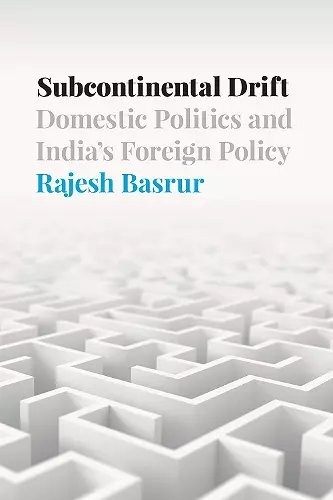Subcontinental Drift
Domestic Politics and India's Foreign Policy
Format:Hardback
Publisher:Georgetown University Press
Published:3rd Jan '23
Should be back in stock very soon
This hardback is available in another edition too:
- Paperback£36.00(9781647122850)

"This is a remarkably deft treatment of Indian foreign policy drift—both 'involuntary' and 'voluntary.' Drawing on neoclassical realism and imaginatively customized to account for the relevant empirics, Subcontinental Drift makes an original contribution to international relations scholarship focused on India without losing sight of fundamental normative concerns."—Siddharth Mallavarapu, professor of international relations and governance studies, Shiv Nadar University, India
How domestic constraints hamper India’s foreign policy and its potential as a superpower
One of the most important developments in today’s changing international system is the emergence of India as a rising power. However, Rajesh Basrur finds that India is hobbled by serious domestic constraints. Subcontinental Drift explains why India’s foreign policy is often characterized by multiple hesitations, delays, and diversions that may ultimately hamper its rise.
Basrur analyzes the concept of policy drift through the lens of neoclassical realist theory to reveal why this drift occurs so regularly in Indian foreign policy and how it affects India’s quest for major power status. Using four cases—the India-US strategic partnership, India-Sri Lanka relations, India’s nuclear strategy, and crossborder terrorism—Basrur identifies two basic explanations for India’s indecision on critical issues. The first, involuntary drift, is related to the distribution of domestic material power, while the second, voluntary drift, is produced by a responsibility deficit.
Basrur develops a fresh theoretical basis for understanding the relationship between India’s foreign and domestic policies and introduces a series of theoretical refinements to neoclassical realism. Subcontinental Drift also provides advice on how policy makers might lower the costs of policy drift. This innovative analysis is essential to understanding the constraints around India’s foreign and domestic security decisions and how they will affect its rise.
[Basrur] has relied upon neoclassical realism, incorporating domestic factors to explain India's foreign policy—a remarkable achievement....Basrur's excellent analysis demonstrates that multiple institutional problems, including the contested nature of Indian federalism and bureaucratic lethargy, affect the quality of Indian policy making.
-- Vinay Kaura, Sardar Patel University of Police, Security and Criminal Justice * ParameteISBN: 9781647122843
Dimensions: unknown
Weight: 567g
264 pages